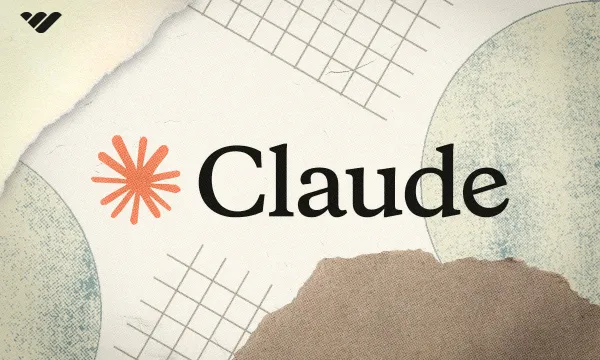When you think of generative AI, the first thing that springs to mind is likely the artificial intelligence chatbot, ChatGPT. But its position as the undisputed king of AI is increasingly coming under threat.
In recent years, ChatGPT’s enormous success has ushered in a range of competitors — including Anthropic’s ethical-centric take on AI, Claude.
This virtuous emphasis is a key part of the Claude brand. As an entrepreneur, you may have considered using AI in many different creative and productive ways. However, the technology has been found to spring some nasty surprises.
Many people ask generative AI tools to provide them with intricate advice and engrossing promotional content. If you fear some LLMs giving you inaccurate, unhelpful and harmful responses, Claude might be the best solution for you.
But what is it, and how does it differ from ChatGPT? Let’s take a look.
What is Claude AI?
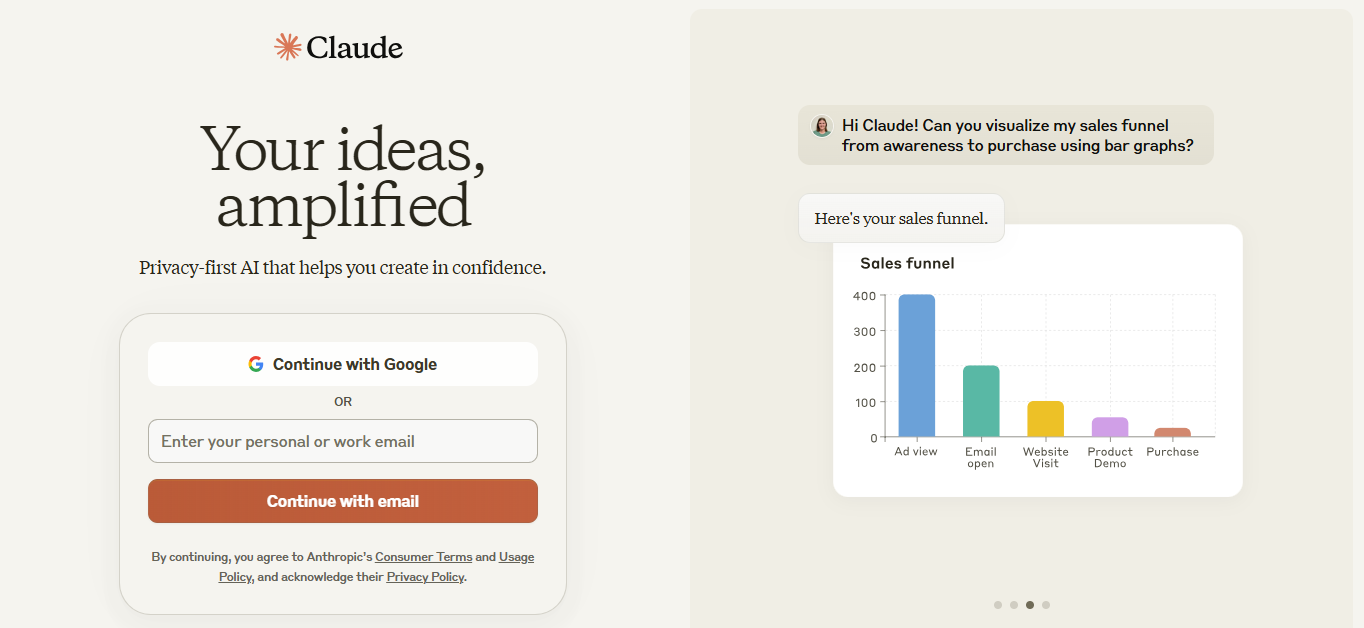
A family of large language models (LLMs) have been released under the Claude banner. LLMs are basically sophisticated chatbots capable of generating tailored text content in response to prompts and questions.
Like other LLMs, Claude has been taught vast amounts of information. This has — in the case of Claude — come from a wealth of sources, including the internet, third parties (via licensing) and individual users.
Having been trained on all this data, Claude can provide in-depth answers to queries typed into its chat box. In essence, conversing with Claude can feel akin to having a sagely, hyper-versatile assistant by your side.
Though mobile apps for Claude are available, you can tap into this AI tool’s full breadth of functionality by turning to the Claude website, claude.ai.
Who made Claude AI?
The AI has been developed by Anthropic PBC, a public-benefit startup founded by siblings (and former members of ChatGPT parent OpenAI) Daniela and Dario Amodei. Anthropic offers the following three Claude AI models…
- Claude 3 Opus
- Claude 3.5 Sonnet
- Claude 3.5 Haiku
Which of them you ought to use will depend on what kind of work you want Claude to do for you. However, only Sonnet can be accessed without a paid subscription.
What can Claude AI do?
Whether you seek to chase lofty corporate goals or even just a side hustle with AI, Claude can extend an invaluable helping hand.
With Claude, your queries can consist entirely of text or additionally extend to images like photos and charts. You can even add Microsoft Word documents, PDFs and other files as attachments for Claude to analyze.
Here are some example scenarios where Claude AI could make a crucial difference…
🙋♂️ Want to ask a question? Whether it’s about something ‘small’, like planning a party, or much more ambitious (e.g. related to world history), Claude can answer.
🖊️ Preparing a job application but unsure whether it is up to scratch? Have Claude AI proofread the cover letter and resume.
🎵 Eager to pen new music but struggling to nail down a strong chorus? Claude can write or rewrite song lyrics, injecting a little fizz into your latest aural masterwork.
📈 Running a startup or SME? Claude AI can make you a business plan, taking account of existing analytics and reports to pinpoint where you should go next.
🌎 Embarking on an overseas vacation? Keep Claude AI with you on your smartphone so that you can translate text into a different language.
🍱 Left with some surplus ingredients but not sure what to make with them? Claude can scan an image of the foods in question and subsequently suggest recipes.
However, many other AI chatbots can take on these jobs, too. So, what differentiates Claude from rivals? According to Anthropic, it’s “Constitutional AI”.
Claude has its own ‘Constitution’ — a set of principles against which it evaluates its own answers. By baking these rules into Claude itself, Anthropic strives to create “an AI system that is helpful, honest and harmless”.
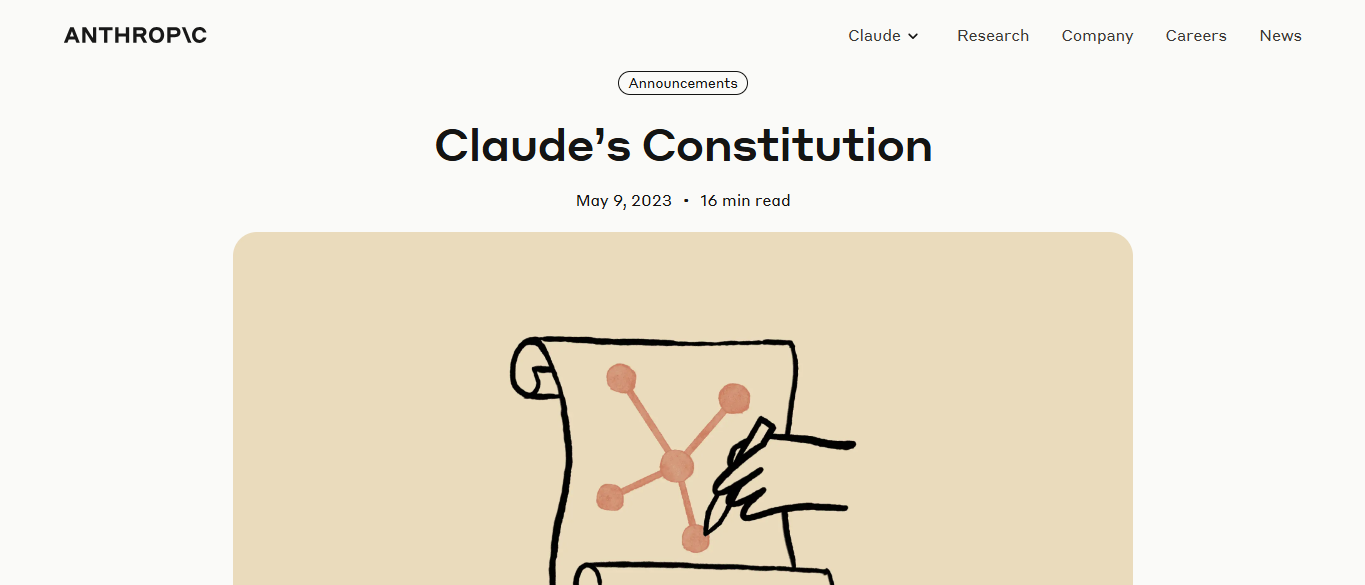
The full list of principles Anthropic has drawn up for the Claude AI can be found on the company’s website, anthropic.com. Claude is programmed to choose those responses that are the…
- Most supportive of freedom and equality
- Least racist and sexist
- Most encouraging of life, liberty and personal security
- Least unlawful, deceptive or inaccurate
- Least dishonest, abusive or misleading
- Least likely to be seen as harmful or offensive to a non-western audience
These are just a few example rules picked from the Constitution, which Anthropic concedes is “neither finalized nor … likely the best it can be”. The team behind Claude “expect to iterate on it and welcome further research and feedback”.
Of the three Claude AI models, Haiku is the fastest and Opus is the most intelligent, while Sonnet strikes a balance between speed and intelligence.
Here is a closer look at the Claude AI models and, in each case, the kinds of tasks the model would best be reserved for…
Claude 3.5 Sonnet
Decided to initially just register a free account with Claude to “try it out”? In that case, 3.5 Sonnet is the version of Claude you will inevitably use first.

Sonnet is bound to be the best Claude version overall for most tasks people are going to want to use AI for. Basically, if the task demands intelligence but also a rapid response, Sonnet is the one to go for, primed to excel when it comes to…
- Retrieving facts, figures and statistics
- Automating repetitive tasks or processes
- Creating computer programming code
- Writing naturally flowing content
- Extracting insights from charts, graphs and diagrams
Sonnet was originally the ‘mid-range’ Claude model, striking a balance between speed and intelligence. However, when it was upgraded to Claude 3.5 in June 2024, Sonnet supplanted Opus as Claude’s most powerful AI model.
Claude 3 Opus
When officially announcing Opus in March 2024, Anthropic called this model its “most intelligent”. The press release added that Opus “can navigate open-ended prompts and sight-unseen scenarios with remarkable fluency and human-like understanding”.
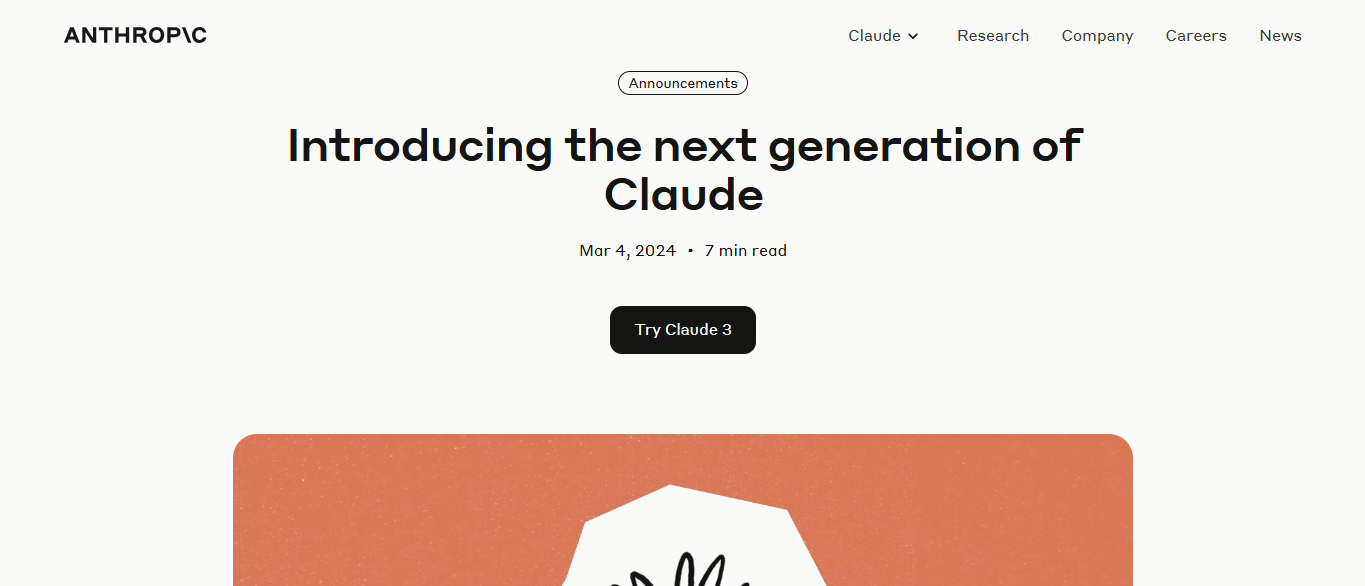
When Anthropic upgraded its Sonnet and Haiku models to Claude 3.5 in October 2024, Opus didn’t get the same treatment. However, even left on Claude 3, Opus remains an intellectual powerhouse ready to take on such complex tasks as…
- Financial modelling
- High-order math and coding
- Research and development
- Strategic analysis
For tasks consisting of multiple steps and much more challenging than what would usually be asked of an AI, Opus fits the bill.
Despite the many merits of Opus, you should save it just for specialty use cases where Sonnet doesn’t meet the grade.
That’s because Sonnet actually outclasses Opus on most benchmarks. Also, of these two AI models, only Sonnet is included on Claude’s free tier.
So, sticking with Sonnet can alleviate the pressure of your overhead expenses when you use AI for moneymaking ventures like selling products online. Sonnet also fetches data faster than Opus, enabling you to spend your time more efficiently.
Claude 3.5 Haiku
Have a need for speed? Haiku is the Claude model best equipped to satiate it. With its step up to Claude 3.5, Haiku now matches Opus on many performance measures.
Haiku doesn’t quite keep pace with Sonnet’s levels of intelligence and capability but can still give accurate answers in delightfully little time.

In the October 2024 press release unveiling Claude 3.5 Haiku, Anthropic particularly highlighted its coding prowess. Compared to Claude 3.0 Haiku, its successor boasts “low latency, improved instruction following, and more accurate tool use,” according to Anthropic.
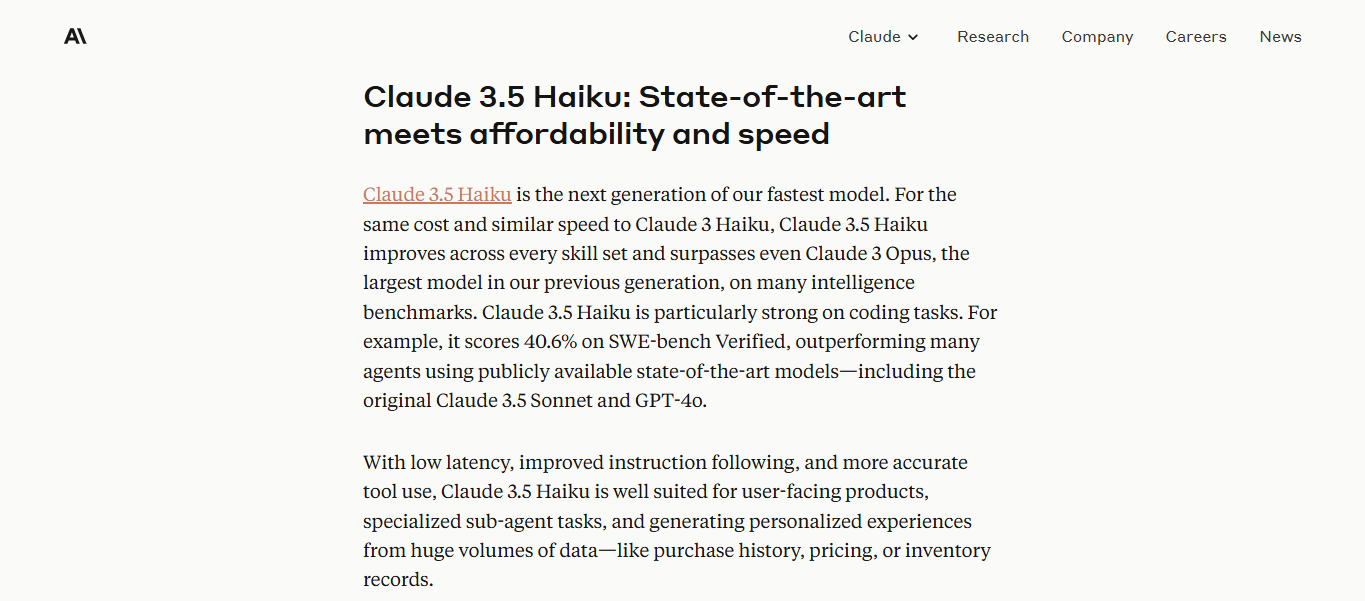
Need to pick out select pieces of data from a lengthy research paper resplendent in charts, graphs and large, unbroken chunks of text? Haiku can do the legwork here — all within seconds.
Haiku can also provide lightning-quick answers to simple (or at least, by AI standards, relatively undemanding) queries. For example, you can feed Haiku a few lines of programming code and, in return, get suggestions on how to improve them.
Oh, and in case you are wondering — yes, Haiku can live up to its name by writing you some actual haikus, if you like!
Claude 3.5 Haiku really comes into its own when you need to reach out to people super-quickly with reliable, high-quality responses.
One good case in point would be if you set up a customer support chatbot as part of your ecommerce store. Looking to sell digital products through this online portal? Haiku can automate the labelling of them for you, saving you valuable time.
Keen on starting an online community? Claude 3.5 Haiku could help keep it safe by contributing to moderation duties. When the community gets besmirched with inappropriate content, Haiku can speedily pick up on it to ensure its timely removal.
How to use Claude AI
Anyone can create a free account for themselves on the Claude AI website, claude.ai. On its homepage, select either of the following options…
- ‘Continue with Google’ to sign up using a Google account you already have
- ‘Enter your personal or work email’ to register with an email address
Clicking ‘Continue with Google’ will trigger a pop-up window that can take you through the steps you must follow to sign up this way. Using this method, you won’t need to come up with a whole new password just for your Claude account.
The alternative signup procedure will spare you having to tie your Claude account to your Google one. Put your email address into the relevant field and then click ‘Continue with email’. You will be sent a special link to click to continue signing up.
Whichever of the two signup methods you opt for, you must confirm your mobile phone number and age before you can create a Claude account.
Select the right flag for your country from the dropdown menu and type your full mobile phone number into the adjacent text field.
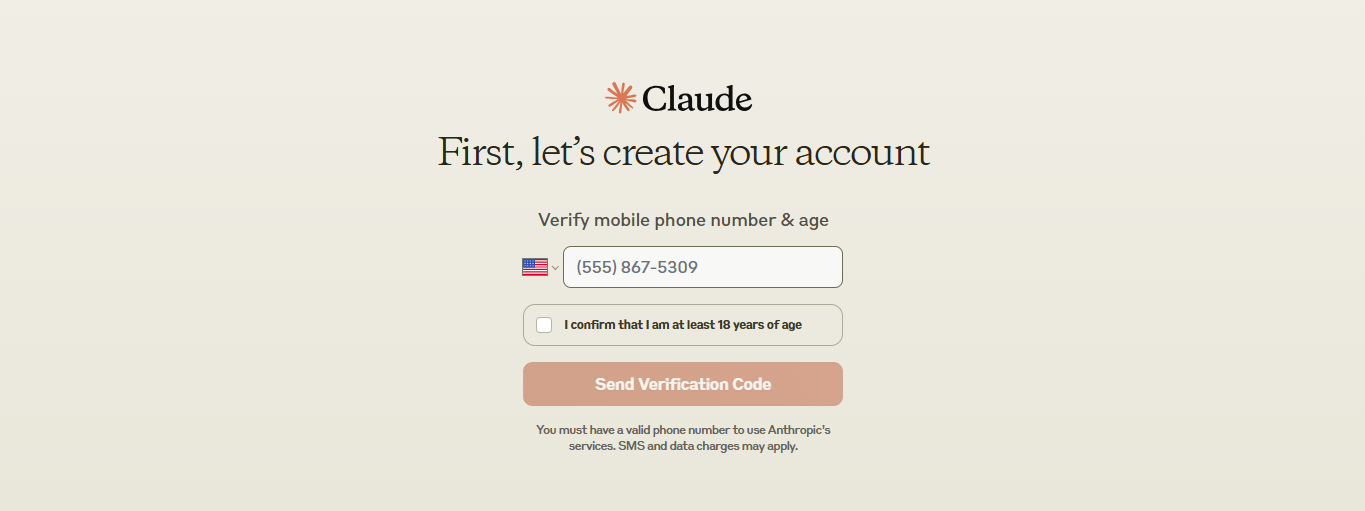
After you click ‘Send Verification Code’, it will be sent to your phone as an SMS message. On the next page, type this code into the ‘Enter verification code’ field.
Once you have done all of that and hit the ‘Verify & Create Account’ button, Claude will want to get to know you better! Give Claude your full name as well as the one-word name you would like the AI to call you on a casual basis.

Claude will give you a few warnings – and ask you to acknowledge them – before you can start using the AI. Read these disclaimers carefully and commit them to memory. You want to ensure you use Claude in the most productive way.
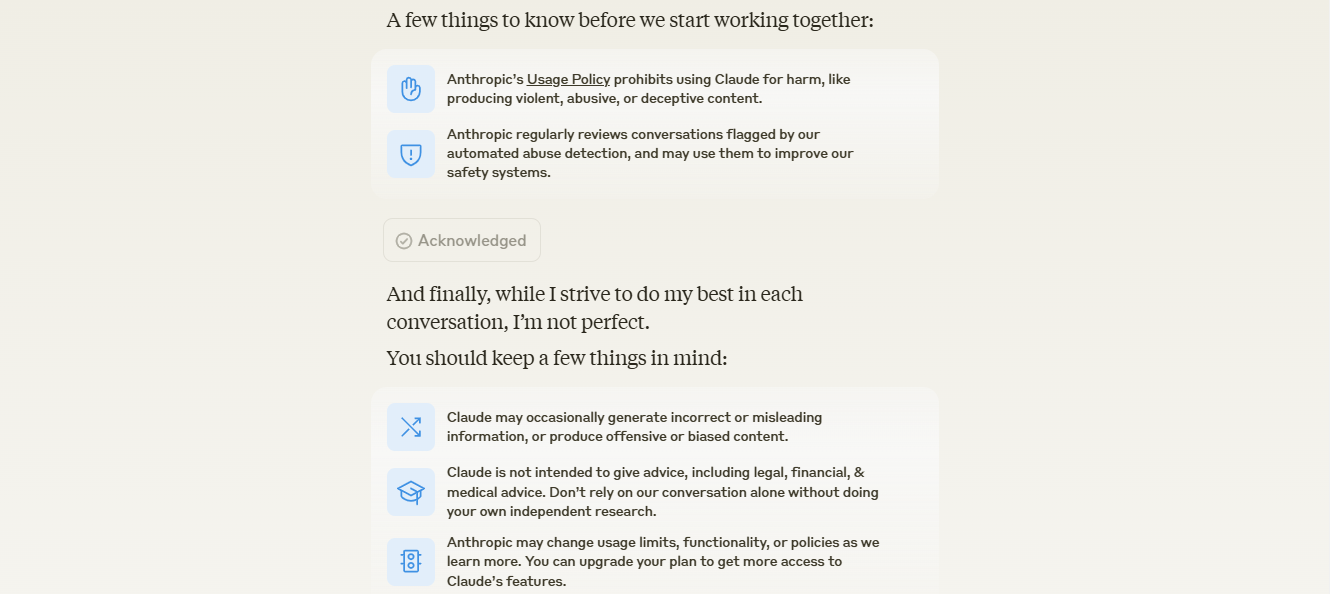
Finally, click ‘Sounds Good, Let’s Begin’ at the bottom of this page. You will be sent to the Claude AI chat screen indicating you are using the limited free plan. (Click ‘Upgrade’ to learn how to upgrade to either the ‘Pro’ or ‘Team’ plan.)
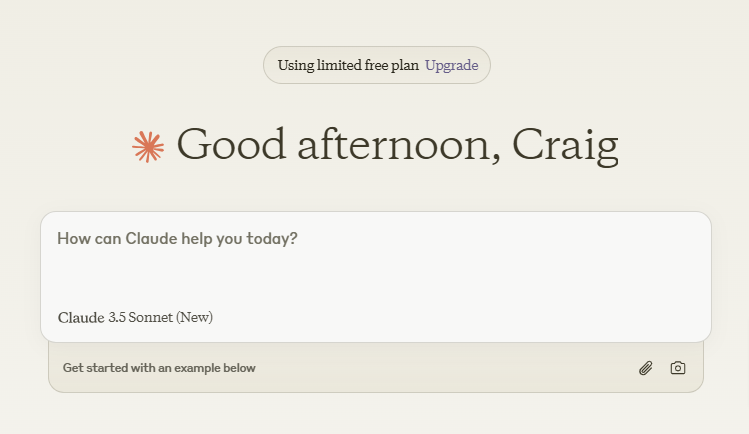
Try out the Claude AI by typing a question into the ‘How can Claude help you today?’ textbox and clicking the ⬆️ button. Feel free to ask something broad, like ‘What is the next Sonic the Hedgehog movie going to be about?’

Sometimes, your request might take a lot more text than this to fully articulate. It could also be difficult for you to clearly convey it in just one line or sentence.
When you do need to create a new line as part of the same request or prompt, press your Shift and Return keys simultaneously. (Hitting the Return key alone will instead send Claude the uncompleted request or prompt.)
Here’s a good example of a command where multiple lines can clarify your meaning…
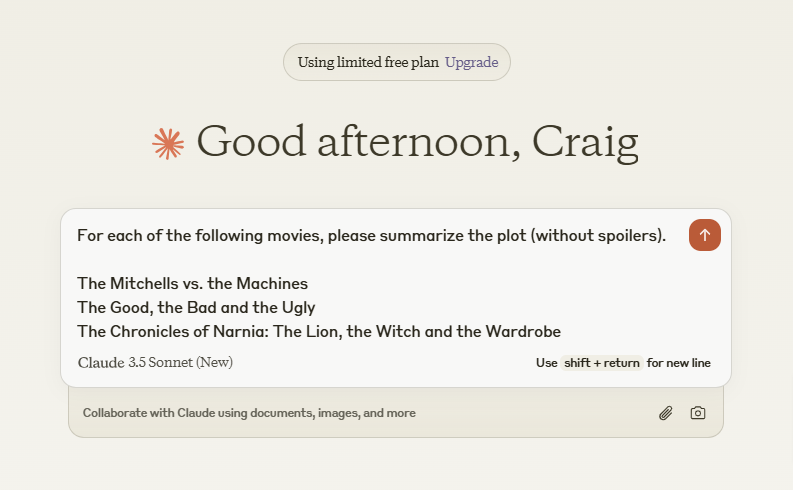
Whatever question you do ask, you might not necessarily be satisfied with the answer. In the instance below, Claude provides only a tentative answer (but also explains why).
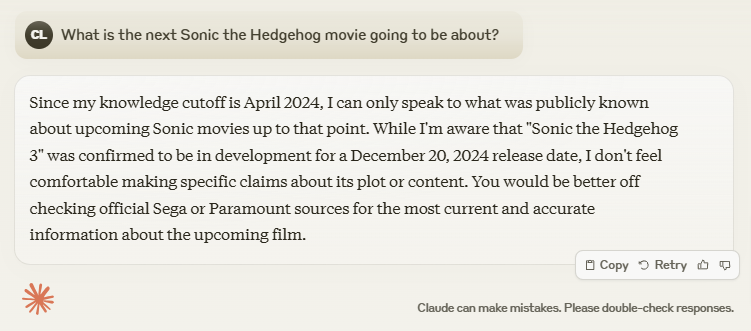
Click ‘Retry’ to make Claude try answering the question again. You can keep clicking to see if you eventually receive a preferable response.
Each response from Claude is also accompanied by a ‘Copy’ link, enabling you to paste the text somewhere else quickly and easily.
Whatever your thoughts about the response, you can give it a 👍 or 👎 by clicking the relevant symbol. If you go for the latter, you can tell Anthropic why you didn’t like the response.
Want to continue the conversation? You can do so with the ‘Reply to Claude…’ textbox at the bottom of the page. Want to begin a whole new conversation? Move your cursor well to the left-hand side of the page to bring up a ‘Start new chat’ link.
As for exactly what Claude AI can do for you, here are several examples…
Give advice
Is decision time coming up? Whether it’s to do with a minor matter or will have major ramifications for your future, Claude can suggest what to do.
This AI can answer any of the following questions (and many others) possibly lingering on your mind…
🎅 What are the best theme ideas for a Christmas party?
📱 How can I improve my iPhone’s battery life?
💧 What should I do if water is leaking from my ceiling?
✉️ What do I need to include in the cover letter for a job application?
Admittedly, these are also questions you could simply Google. AI stands out from a basic search engine when you input long-form queries rich in contextual details about your personal situation. For example, you could ask Claude…
🥇 Which jobs would best my specific skills and experience?
💻 Which laptop would most closely meet my work-from-home requirements?
🎓 Which college major should I choose, given my background?
🏙️ Which town or city should I move to, considering my lifestyle?
Still, as Anthropic implies in its disclaimers about Claude, you should avoid automatically treating everything it says as gospel. So, don’t fall back entirely on AI. Instead, make a point of also reaching out to humans who have the right expertise.
Write (and rewrite) content
Are you a keen wordsmith? Maybe you fancy blogging about your travels or penning an ambitious historical fantasy novel. Wherever your way with words takes you, Claude can help by clearing up errors in spelling, grammar and punctuation.
When AI writes long-form content, such as articles, the text can come across as overly robotic and generic. Claude could, however, reel off a few suggestions that provide the crucial spark of inspiration for your next literary project.
To illustrate this point, here are several ‘little’ things Claude AI can do for writers…
- Throw up ideas for short stories
- Produce short descriptions for an online store’s product listings
- Put together some journaling prompts
- Outline how to structure an essay
What if you have already written something lengthy and now need an impartial proofreader for it? Claude can objectively review and edit written work, e.g. by…
- Rewriting a letter to make it sound friendlier or more professional
- Rearranging a resume so that recruiters can more easily understand it
- Removing instances of overly ‘salesy’ language from promotional articles
- Taking redundant phrases and sentences out of technical how-to guides
The trick is to treat AI as an assistant rather than a writer on a par with yourself. Claude isn’t the only option, either. An array of other AI writing tools, too, can help you to sharpen up your text without shedding its vibrancy and personality.
Visual processing
You might have some visual material you would like Claude to describe or analyze. At the Claude chat screen, you can upload any of the following types of image (and others) to include with your request…
- Photo
- Illustration
- Chart
- Graph
- Diagram
The file formats accepted by Claude include PDF, DOCX, RTF, CSV and HTML. Make sure the file you want to attach is saved on your computer. Then click the📎 icon on Claude AI’s chat screen before locating and selecting the file.
There are various things you can ask Claude AI to do with an image you present to it. Here are several examples…
- Summarize the content of this file.
- Which people listed on this CSV spreadsheet live in Connecticut?
- What does this financial data suggest my business should do next?
- Does this illustration come across as fun, friendly and eccentric?
- What are the main plot points of this novel uploaded in PDF format?
It can help to start with basic questions and later ask Claude to elaborate on specifics of what it unearths.
So, what if Claude told you 22% of people on the above-mentioned hypothetical spreadsheet live in Connecticut? You could follow up by asking which percentage of those Connecticut residents, in turn, are based in the state’s capital city, Hartford.
Claude AI’s desktop and mobile apps
Whichever AI solutions you decide to stick with for the long haul, they could soon become indispensable to your day-to-day routine.
Unfortunately, even if you bookmark your favored AI website, diving back into it can be a cumbersome process. Having to load first the web browser and then the website itself before you can even start using the AI is not ideal.
Hence the rationale for installing an AI app rather than simply settling for a website. Encouragingly, Anthropic offers Claude AI apps for desktop and mobile platforms.
As with Claude’s web version, how much (if anything) you pay for usage of these apps will depend on your choice of plan.
Mac and Windows apps
On October 31, 2024, Anthropic took to social media to announce that Claude apps for Mac and Windows were now available to download.
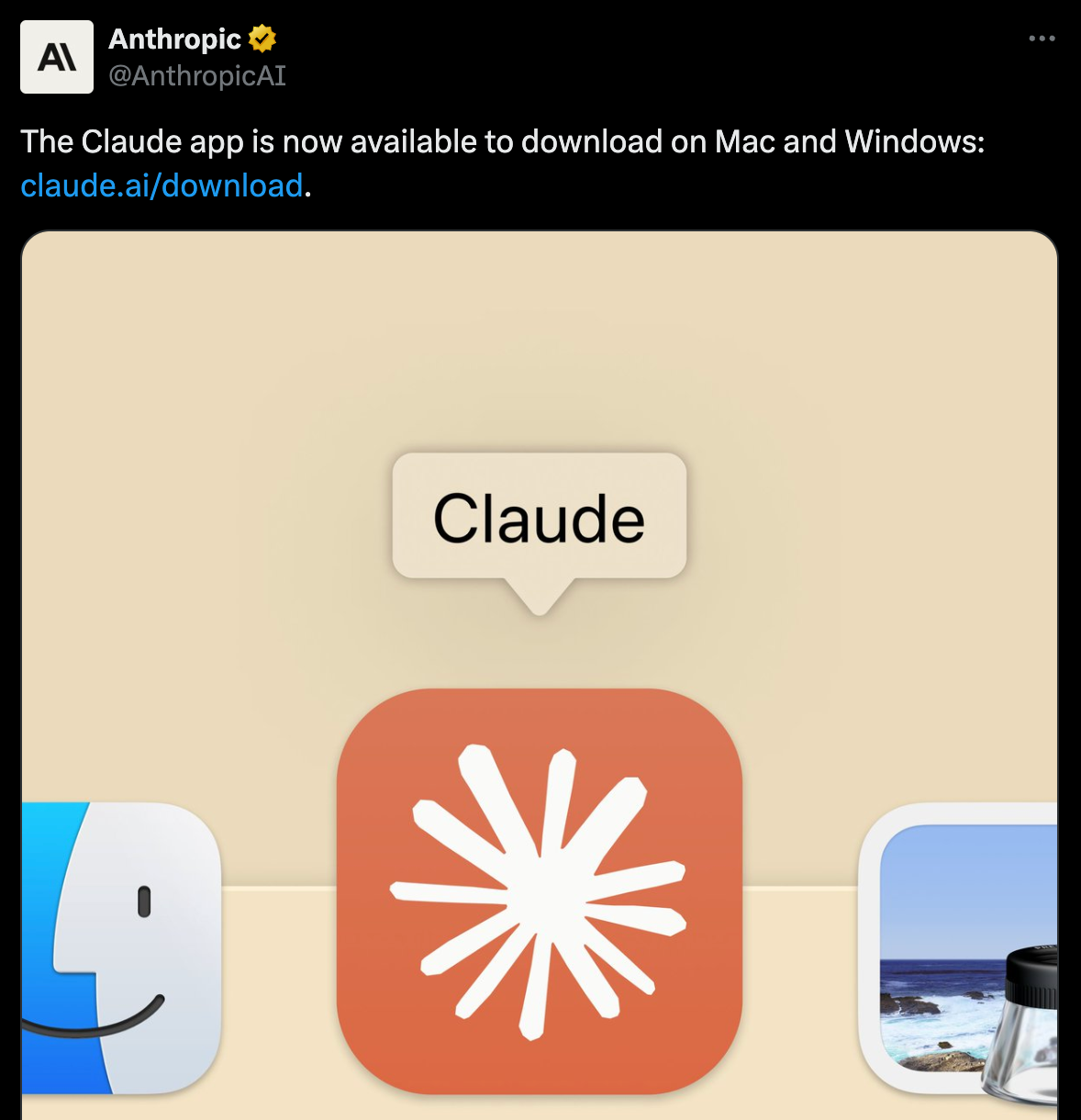
Admittedly, using Claude on these apps is not markedly different to doing so on the web version. Many of the same functions — such as to view old and starred conversations with Claude — have been carried over.

However, installing either desktop version of the Claude app on your computer will let you start Claude chats appreciably more quickly. The download links for these Claude apps are on the Anthropic website.
iPhone, iPad and Android apps
These have been around for longer than the Claude desktop apps. The iPhone app arrived in May 2024, with the Android app following in July.
The following October, Anthropic unveiled the first-ever Claude app specially optimized for the iPad’s display.
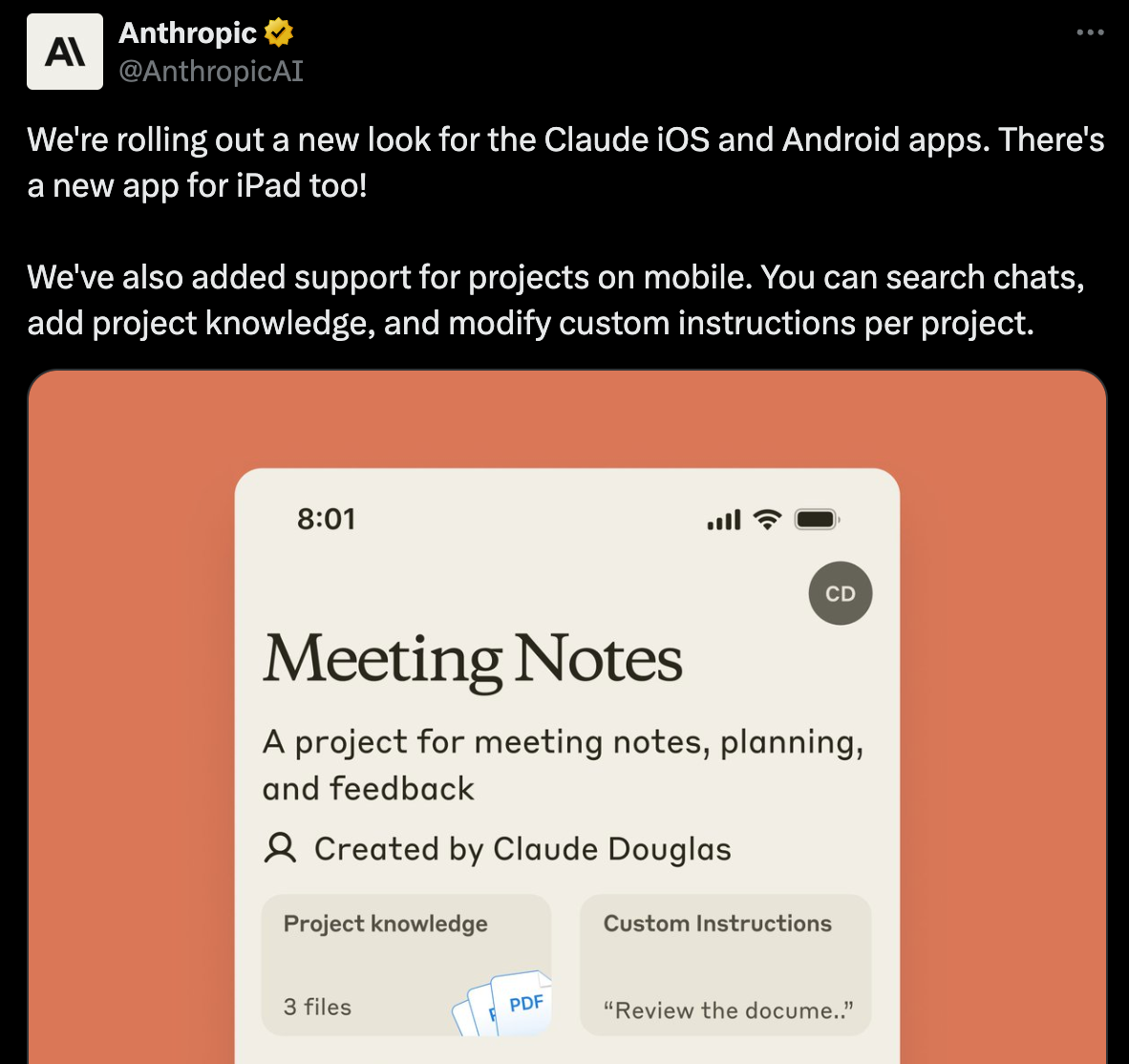
These apps help to keep Claude competitive with ChatGPT, mobile apps of which are also available on iPhone, iPad and Android.
The Android version is thought of highly by users on Google Play, having garnered a 4.5/5 average rating from 23.9K reviews.
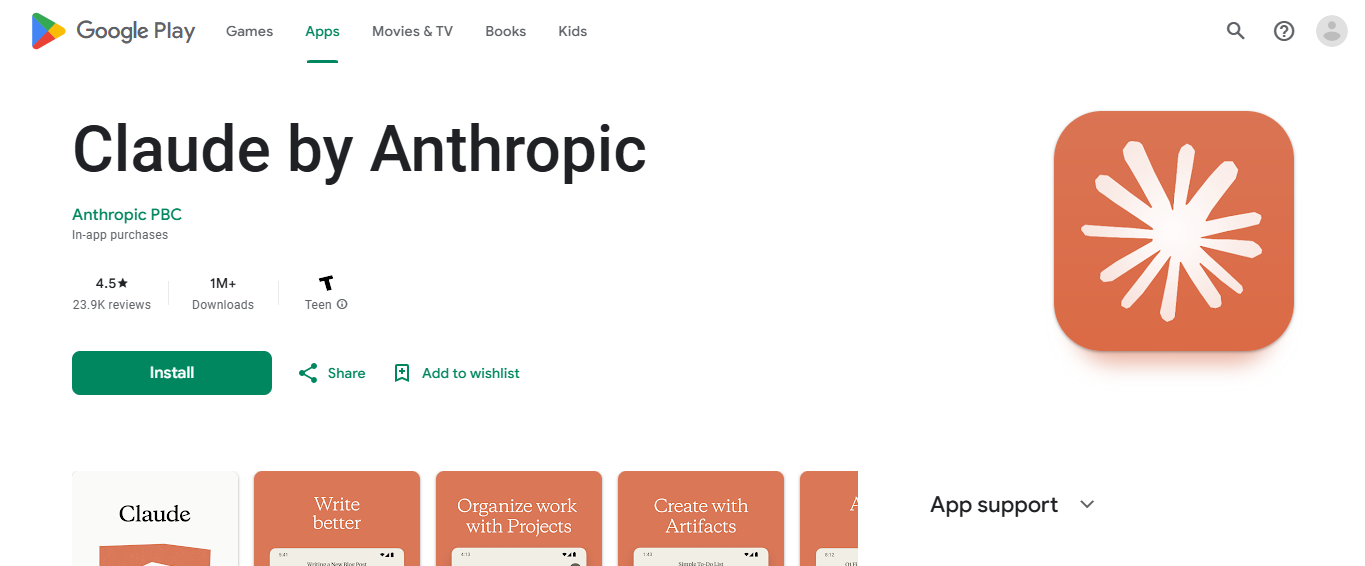
Claude AI is similarly a winner on Apple’s App Store for iOS and iPadOS. In this app outlet, Claude has been rated 10.9K times, adding up to an average rating of 4.8/5.
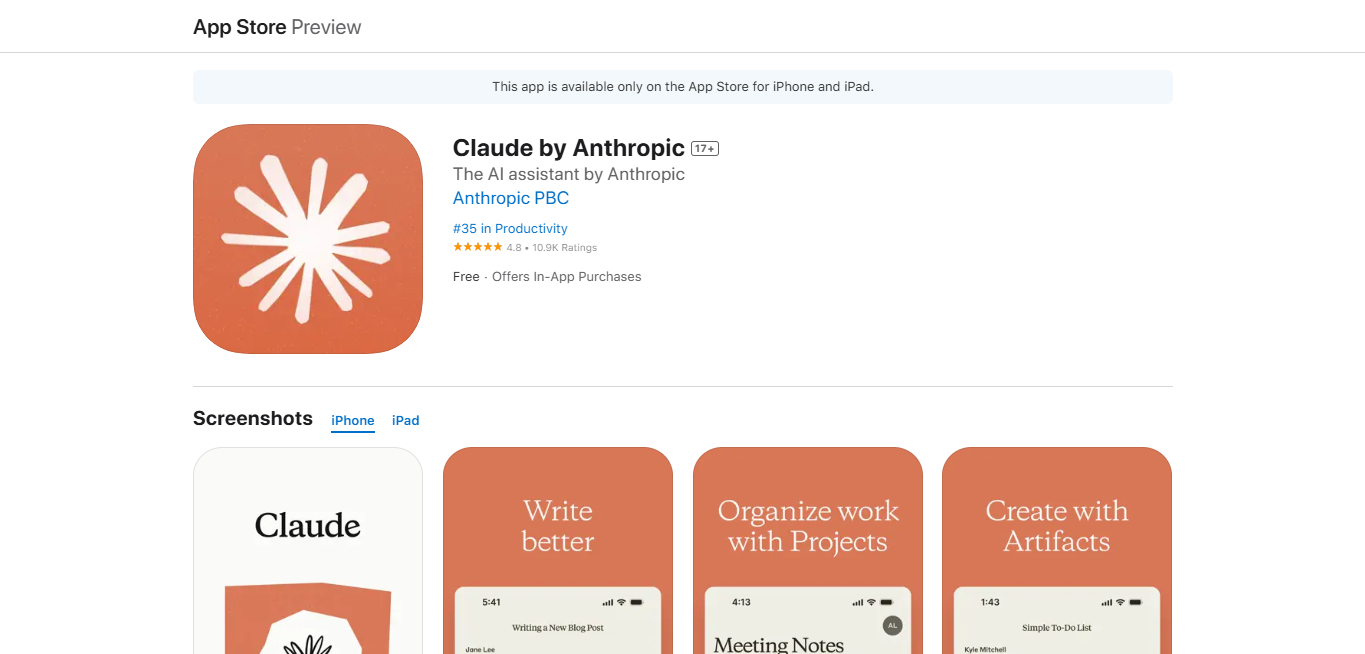
It would still be worthwhile for you to peruse various online reviews of whichever app version piques your interest. Some of the reviews might flag up certain ‘dealbreakers’ that would persuade you to continue using the web version of Claude instead.

Get the most out of AI with Whop
There are now many different LLMs on the market — from ChatGPT to Claude and entries from long-established tech players. Just look at Google’s Gemini (formerly Bard) as well as Apple Intelligence, which comes built into Apple operating systems.
In practice, though, how much you practically benefit from AI strongly depends on how you use it. Here at Whop, various brands have come together to release a wealth of AI-powered tools and resources.
Type ‘artificial intelligence’ into the search field at the top of the Whop homepage to start perusing the options.
Interested in investing? Subscribe to AI ALGORITHMS (LIVE TRADING) to access AI-analysed data that can inform your trading decisions.
Want to sell books? The Book Lab course teaches how to harness AI to fuel your literary success.
Many ‘whops’ (online hubs) on the Whop platform offer free ‘taster’ content. However, great-value prices come as standard even with ‘premium’ material on Whop.
So, what are you waiting for? Start exploring Whop today to discover how you can deepen your AI knowledge.
